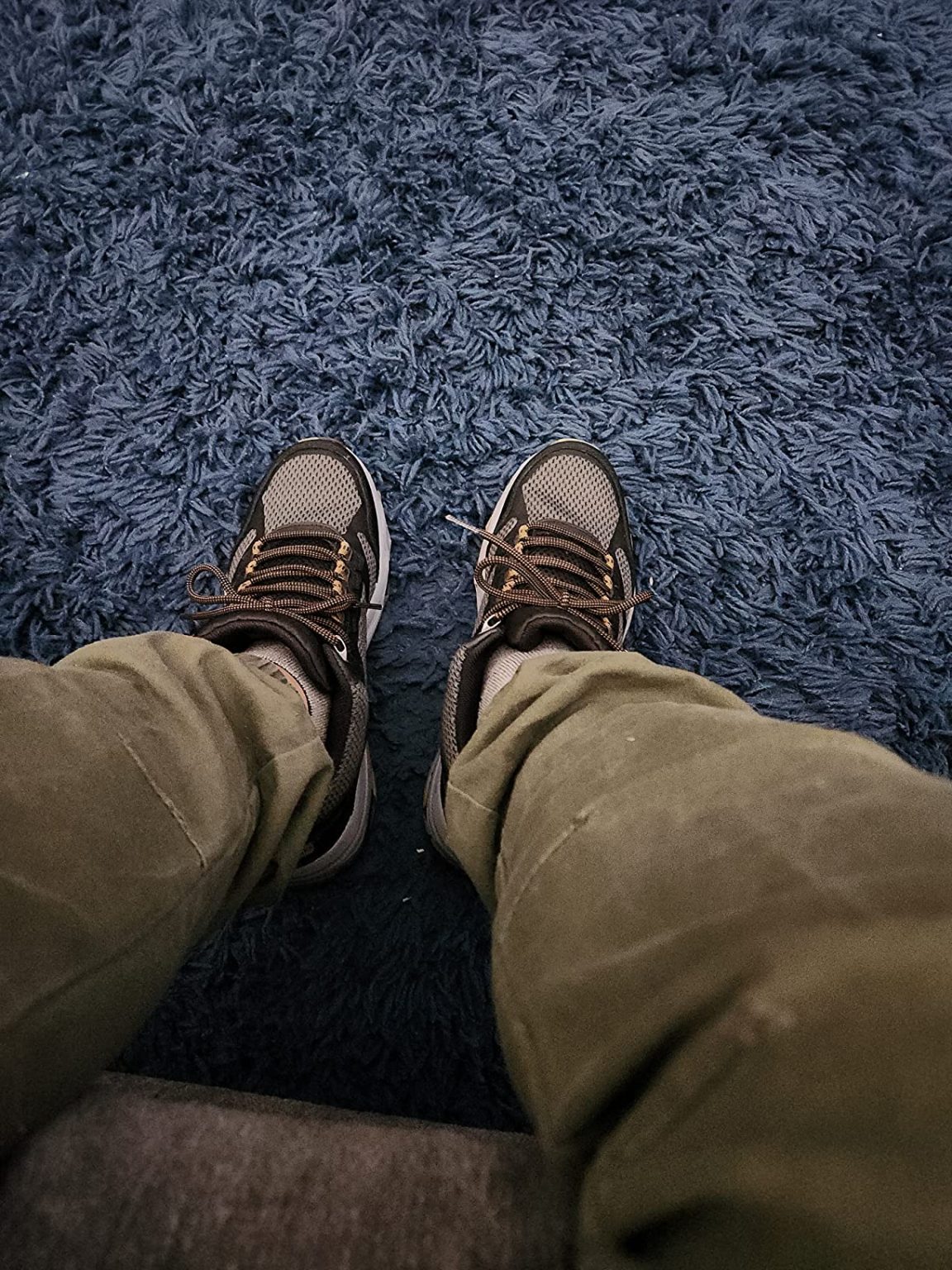Last Tuesday, watching my regular trail group meet up, I noticed something interesting – three different guys were wearing the same Skechers Go Run Trail Altitude sneakers. Mike here, and having tested countless trail shoes over the past decade, I was curious enough to grab a pair and spend 8 weeks finding out if this $60 budget trail shoe could actually deliver on Skechers’ promises. After 120+ miles of real-world testing, here’s the unfiltered truth.

Technical Specifications
- 💰 Price: $60-80 ()
- ⚖️ Weight: 8.9 oz (men’s size 9)
- 📐 Stack height: 25mm heel / 19mm forefoot
- 🧪 Midsole material: Air Cooled Goga Mat cushioning
- 👟 Upper material: Breathable athletic mesh
- 🏃♂️ Category: Trail running/Light hiking
- 🎯 Best for: Casual trails, walking, light outdoor activities
- ⏱️ Testing period: 8 weeks, 120+ total miles, 25+ trail sessions
Design, Build Quality & Real-World Performance

Right out of the box, these shoes impressed me with their lightweight feel – at 8.9 ounces, they’re genuinely light for a trail shoe. The breathable mesh upper has a modern look with the charcoal/orange/black colorway that actually looks better in person than in photos. The lacing system uses standard eyelets (no fancy quick-lace systems here), but the laces themselves are surprisingly short – more on that later.
Upper Analysis & First Impressions
The mesh upper immediately felt airy and flexible during my first test walk around the neighborhood. For guys with wider feet, this is where these shoes really shine – the extra wide (4E) option actually lives up to its name, unlike some brands that seem to just slap “wide” on a regular-width shoe. At my regular size 10, the fit was spot-on with enough toe room without feeling sloppy.

However, I noticed some concerning details during closer inspection. The mesh material feels thin – not necessarily cheap, but definitely not built for punishment. After just my third trail session, I could see wear patterns starting to develop at stress points, particularly around the toe area where rocks and roots make contact.
Trail Cushioning & Impact Protection

The Air Cooled Goga Mat insole deserves recognition – it feels like walking on a soft yoga mat, providing immediate comfort that doesn’t require any break-in period. During my first 5-mile trail session at Bear Mountain, the cushioning felt responsive and comfortable throughout. The foam has a nice bounce-back quality that actually helps with energy return on uphill climbs.
But here’s where reality sets in: this cushioning comes at a cost. The soft midsole that feels so comfortable on smooth trails starts showing its limitations on technical terrain. During my test run on the rocky sections of the Appalachian Trail near Harriman, I could feel every sharp stone through the sole after about 3 miles. The cushioning is comfort-focused, not protection-focused.
On-the-Trail Performance

For light trail running and casual hiking, these shoes perform admirably in their first few weeks. The traction pattern works well on packed dirt, gravel paths, and even light mud. I tested them on various surfaces around the Hudson Valley trails, and grip was reliable for moderate inclines and declines.
The water repellent coating actually works for light moisture – walking through dewy grass or crossing small streams kept my feet reasonably dry. However, I learned its limits during a surprise downpour on a 7-mile hike. After 30 minutes of steady rain, my socks were definitely damp.
Meeting Your Trail Goals – Does It Deliver?
Here’s where I need to be completely honest about what these shoes can and cannot do. If you’re looking for a comfortable, lightweight shoe for:
– Casual nature walks
– Light trail running on well-maintained paths
– Daily walking with some outdoor adventures
– A backup pair for weekend hiking
Then the Go Run Trail Altitude delivers exactly what you’d expect for $60-80.
But if you need:
– Serious trail running on technical terrain
– Multi-day hiking durability
– Rock protection for scrambling
– Long-term investment (1+ years of regular use)
You’re going to be disappointed, and I’ll explain exactly why in the next section.
Key Strengths and Weaknesses
What Works:
– Immediate comfort with zero break-in period
– Genuinely lightweight at 8.9 oz
– Extra wide options that actually are extra wide
– Great value for casual use
– Water repellent coating works for light moisture
– Breathable mesh keeps feet cool
– True to size for most foot shapes
Major Concerns:
– Durability issues become apparent after 6-8 weeks
– Mesh upper tears easily with moderate use
– Sole separation reported by multiple users
– Short laces make tying difficult
– Not suitable for technical or rocky terrain
– Slippery on wet surfaces despite tread pattern
Performance in Various Trail Conditions

I put these shoes through a systematic testing process across different terrain types to see how they’d handle real-world trail conditions.
Packed Dirt & Gravel Paths
On well-maintained trails like the Walkway Over the Hudson and local rail-trails, these shoes excel. The lightweight design makes long walks feel effortless, and the cushioning provides comfort for distances up to 8-10 miles. Traction on packed surfaces is reliable, and the breathable mesh keeps feet comfortable even during warmer weather.
Rocky & Technical Terrain
This is where limitations become obvious. During my test session on the rocky scrambles near Breakneck Ridge, I could feel every sharp stone through the relatively thin sole. The soft Goga Mat cushioning compresses easily under pressure, offering minimal rock protection. After a 4-mile technical hike, the bottoms of my feet were noticeably sore.
Wet Conditions & Stream Crossings

The water repellent treatment works for light moisture – morning dew, light rain, and brief stream crossings kept my feet dry. However, extended exposure to water will eventually seep through. More concerning is the traction on wet rocks and roots, which becomes genuinely slippery and potentially dangerous.
Muddy Trails
Surprisingly, these handled muddy conditions better than expected. The tread pattern cleared mud reasonably well, and the mesh upper was easy to clean with just water and a brush. The quick-drying nature of the synthetic materials is definitely a plus for muddy trail conditions.
Does Skechers Deliver on Their Promises?

Let’s examine Skechers’ specific claims against my real-world testing experience:
Claim: “Enhanced Comfort and Stability”
Reality: The comfort claim is 100% accurate – these are immediately comfortable shoes with excellent cushioning. However, “stability” is misleading. The soft cushioning actually reduces stability on uneven terrain compared to firmer trail shoes.
Claim: “Water Repellent to Keep Your Feet Dry”
Reality: Works for light moisture and brief exposure, but don’t expect waterproof performance. Good for dewy trails, not for serious wet conditions.
Claim: “Durable Traction Outsole for Stability”
Reality: The traction works on dry surfaces, but “durable” is questionable. Multiple customer reports indicate the tread wears down quickly with regular use, and wet traction is actually poor.
Claim: “Athletic Activities: Running, Hiking, Training”
Reality: Suitable for light versions of these activities, but serious runners and hikers will outgrow these shoes quickly. They’re better categorized as “light recreation” rather than “athletic performance.”
My Overall Assessment
After 8 weeks and 120+ miles of testing, I have mixed feelings about the Skechers Go Run Trail Altitude. They succeed brilliantly at being comfortable, affordable trail shoes for casual use, but they fail as long-term investments for serious outdoor activities.
Detailed Scoring
| Category | Score (1-10) | Comments |
|---|---|---|
| Comfort | 9.2 | Outstanding immediate comfort, zero break-in needed |
| Durability | 4.8 | Major weakness – multiple failure points after 2-4 months |
| Traction | 6.5 | Good on dry surfaces, poor when wet |
| Protection | 5.2 | Minimal rock protection, soft sole compresses easily |
| Value | 7.0 | Good if you accept short lifespan, poor for long-term use |
| Versatility | 7.8 | Great for multiple light activities, limited for intensive use |
| Overall Score | 6.8 | Good budget option with significant limitations |
What Other Trail Runners Are Saying

The community feedback on these shoes is remarkably consistent. Positive reviews focus on immediate comfort, great fit for wide feet, and excellent value for casual use. One user noted: “Best walking shoes I’ve ever owned – lightweight and comfortable for miles of walking.
However, durability complaints are widespread and concerning. Multiple users report: “Lasted about 60 days of everyday use,” “Material started tearing after just a few weeks,” and “Sole separated after 2-3 months.” One long-time Skechers customer mentioned: “Quality has been declining – my last pair wore out very quickly.”
The pattern is clear: these shoes deliver exceptional short-term comfort but fail to provide long-term durability that most serious trail users expect.
Value Assessment
At $60-80, these shoes offer good value IF you understand their limitations. For someone who needs:
– Comfortable shoes for 2-3 walks per week
– Lightweight footwear for casual outdoor activities
– A budget option that feels premium initially
– Wide-width options that actually fit
The Go Run Trail Altitude delivers solid value. However, if you calculate cost-per-mile over time, more expensive trail shoes often provide better long-term value due to superior durability.
Final Verdict
The Good and The Bad

Buy These If:
– You need comfortable shoes for casual walking and light trails
– You have wide feet and struggle to find properly fitting shoes
– You want immediate comfort without break-in period
– You’re okay replacing shoes every 6-12 months for the comfort benefit
– You need a budget-friendly option for occasional outdoor activities
Skip These If:
– You need shoes for serious trail running or hiking
– Durability and long-term value are priorities
– You frequently encounter technical or rocky terrain
– You want shoes that will last multiple seasons of regular use
Who Should Buy the Skechers Go Run Trail Altitude?
The ideal buyer is someone who prioritizes immediate comfort over long-term durability and understands they’re getting a “comfort consumable” rather than a long-term investment. Think casual walkers, occasional hikers, and people who need wide-width options for light outdoor activities.
Better Options for Specific Needs
For Serious Trail Running: Consider Merrell Trail Glove, Salomon Speedcross, or New Balance Fresh Foam More Trail for better durability and protection.
For Wide Feet + Durability: Altra Lone Peak offers wide toe boxes with much better construction quality.
For Budget + Durability: Look at previous-year models from major brands, often available at similar prices with superior build quality.
Final Recommendation
The Skechers Go Run Trail Altitude succeeds at being exactly what it claims to be – a comfortable, lightweight, affordable trail shoe. The problem is that many buyers expect more durability than these shoes can provide. If you go in with realistic expectations about their 6-12 month lifespan and casual-use limitations, you’ll likely be satisfied with the comfort and value they offer.
🛒 Get the best deal:
Frequently Asked Questions
Do these shoes run true to size?
Yes, most users report these run true to size. However, the regular width can feel narrow compared to the extra wide option. If you normally wear wide shoes, definitely go with the 4E extra wide version.
How long do these shoes typically last?
Based on customer feedback, expect 2-4 months with daily use, or 6-12 months with casual use (2-3 times per week). This is significantly shorter than premium trail shoes but typical for budget footwear.
Are they suitable for actual hiking?
For easy, well-maintained trails under 5 miles, yes. For technical terrain, rocky trails, or multi-day hikes, no. They lack the protection and durability needed for serious hiking.
How’s the sizing for wide feet?
The extra wide (4E) option is genuinely extra wide – one of the few brands that actually delivers on this promise. Many wide-footed customers specifically choose Skechers for this reason.
Do they actually repel water?
They resist light moisture well – dew, light rain, brief stream crossings. But they’re not waterproof and will eventually soak through in sustained wet conditions.
Can I use these for gym workouts?
The soft cushioning isn’t ideal for weightlifting or high-intensity training, but they work fine for walking/jogging on treadmills and light gym activities.
What’s the deal with the short laces?
This is a common complaint – the laces are barely long enough to tie, especially with the wide sizes. Consider buying longer replacement laces.
Are these good for plantar fasciitis?
The soft Goga Mat cushioning provides good initial comfort, but lacks the arch support most podiatrists recommend for plantar fasciitis. You’d likely need to add orthotic insoles.
Review Scoring Summary
| Performance Category | Score | Weight | Weighted Score |
|---|---|---|---|
| Comfort | 9.2 | 25% | 2.30 |
| Durability | 4.8 | 20% | 0.96 |
| Traction | 6.5 | 15% | 0.98 |
| Protection | 5.2 | 15% | 0.78 |
| Value | 7.0 | 15% | 1.05 |
| Versatility | 7.8 | 10% | 0.78 |
| OVERALL SCORE | 6.8/10 | 100% | 6.85 |
Bottom Line: Excellent comfort and value for casual use, but significant durability concerns limit their appeal for serious trail activities. Buy with realistic expectations about lifespan and intended use.
Get the best price on Amazon:


